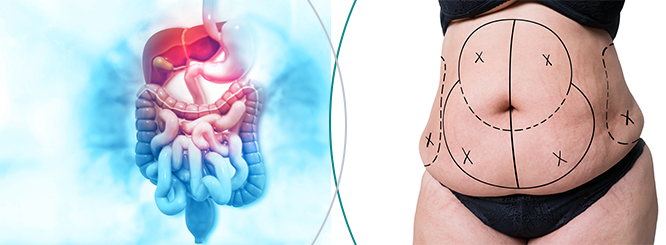
Nearly 71% of the American population is either overweight or obese, according to a 2016 report from the National Center for Health Statistics. As obesity is linked to cardiovascular diseases and type 2 diabetes, which are considered some of the deadliest diseases worldwide, preventing and treating obesity has become one of the most urgent public health issues of our time. Weight loss as low as 5% can significantly improve quality of life. However, losing weight does not come easy. Diet and exercise regimens usually accomplish little weight loss, which may be regained later on.
Surgical procedures, such as bariatric surgery and liposuction, are effective and safe ways to lose weight. If you have tried to lose weight by committing to strict diet programs, by following intense exercise routines, and by changing lifestyle habits, but failed at getting any results, you might be considering if a surgical intervention for weight loss is the right choice for you. There are many different choices of surgeries for overweight and obesity, and getting to know every one of them can be very overwhelming. In what follows, we will guide you through the differences between bariatric surgery and liposuction.
If you are interested in knowing which weight loss alternative is the right fit for you, please call us at our clinic, LIMARP International Center of Excellence for Obesity. Our facilities and lead surgeon, Dr. Liza María Pompa González, have been accredited for their excellence in safety and efficiency by the Surgical Review Corporation.
Differences between bariatric surgery and liposuction:
Type of surgery
Bariatric surgery and liposuction are both surgeries in which the main focus is getting rid of excess body weight. However, each one of them is a very different kind of surgery. A liposuction, also known as lipoplasty and body contouring, is a type of cosmetic surgery. It’s intended for patients who are interested in reducing deposits of body fat, and it may be done in the abdomen or torso, thighs, hips, arms, buttocks and neckline, and under the chin.
In contrast, a bariatric surgery is a medical treatment for obesity. There are many different kinds of bariatric surgery, but they all have one thing in common: they reduce the size of the stomach by either restricting its capacity or extracting a large part of it. Some bariatric surgeries also include malabsorptive procedures, which ultimately change the metabolic functioning of the patient by shortening a part of the small intestine.
A liposuction could also be a complementary procedure after a bariatric surgery to remove excess of skin or esthetic issues.
Surgical procedures
Bariatric surgery and liposuction are two very different surgical procedures. A liposuction is the surgical removal of subcutaneous fat with the usage of a suction device. The surgeon may remove as much as 5 liters of fat, which amounts to almost 11 pounds. This method leads to contouring the tone of the body and defining a leaner silhouette. Body builders, athletes, and people with slight overweight might choose this procedure to correct small areas of fat that are not responsive to exercise. The results of liposuction are usually subtle, and they even might go unnoticed to acquaintances that don’t frequent the patient very often.
Bariatric surgery, by contrast, uses laparoscopic methods to intervene the stomach. Some of these surgeries, like the gastric band, restrict the size of the stomach by adjusting a silicon band around it; others, like the gastric sleeve, remove a big part of the stomach and re-shape what is left as a small tube; a more complex procedure, like the gastric bypass, divides the stomach in two and shortens the digestive track by attaching the small intestine to the upper division of the stomach. A patient who undergoes bariatric surgery can expect to lose as much as half of his or her weight, depending on the type of surgery and commitment to a healthier lifestyle.
Candidates
Bariatric surgery and liposuction are destined for very different kinds of patients.
Liposuctions are intended for people who might be slightly overweight, or who have accumulated fat deposits in different parts of their body. As a stand-alone procedure, most liposuctions are practiced in patients who have a body mass index (BMI) below 29. Candidates for liposuction should have good skin tone and elasticity; they should also be very healthy, with a strong immune system and no current conditions of diabetes, nor any blood circulation issues.
Bariatric surgeries are treatments for obesity. As such, the traditional candidate for bariatric surgery has a BMI higher than 40. Patients with a BMI >35 might also be eligible if they suffer from health conditions like type 2 diabetes, fatty liver disease, hypertension, or heart disease.
Benefits
There are very different benefits in bariatric surgery and liposuction. The benefits of liposuction are mostly cosmetic. At low rates, liposuction can help in conditions in which fat accumulates in specific areas, like gynecomastia, where fat accumulation occurs in men’s breasts.
In contrast, bariatric surgery brings many health benefits. It improves glucose and insulin levels, leading to amelioration and even resolution of type 2 diabetes; it improves cardiovascular health; it boosts fertility and alleviates POCS symptoms; it brings relief to joint pain, and it eliminates sleep apnea.
Contact us
If you would like to know more about bariatric surgery, call our clinic. At LIMARP, our team of specialists will provide orientation about which treatment is the best choice for you.


